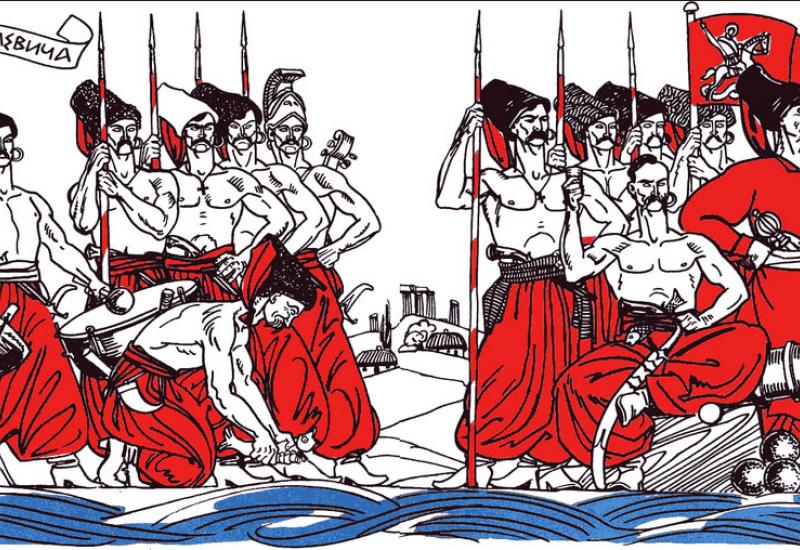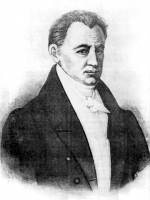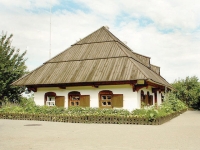Where the general good in the doldrums,
Forget the father, and forget the mother,
Fly duty to correct!
Ivan Kotlyarevsky.
Ivan Kotlyarevsky - the pride of Ukraine. Without him, we do not have Taras Shevchenko, and without Shevchenko, will we exist in the world as a nation! 240 years ago, in August 9, Ivan was born in the family of Petr Kotlyarevsky, the Cossack of Reshetilovska hundred. He was destined to become an outstanding Ukrainian writer who for the first time in Ukraine through his works spoke to Ukrainian in their native language, starting a new era in Ukrainian literature.
Helena Pchilka compared Ivan Kotliarevsky with the first spring flower. She said:
You, as a clear dawn,
Appeared in the skies
And hope lit sweet
In sad downcast eyes.
Praise to you, thank lifetime,
You - Ukraine will be back!
Praise and glory immortal
Happy for your initiative!
Poltava at that time, as biographers of Kotlyarevsky remembered, had approximately 8,000 inhabitants and resembled a village. It was the county town. The Kotlyarevsky family was considered noble. They have some land, some serfs, who were later released by the writer. Time for our people then was difficult. Ukraine, joining Russia, had completely lost its independence. In 1764 the hetmanship was canceled, and in 1775 Zaporozhye - the last bastion of Cossack's liberty, was eliminated. Cossacks did not have the strength any more. Their foreman basically abdicated its people and language and went to the Russian nobility while the peasantry was simply turned into serfs. There was darkness - and there were no signs of sunny morning. Suddenly the darkness in the socio-political, educational and cultural life of Ukraine cut a bright light - in 1798 in St. Petersburg there was saw the light of the first three of the "Aeneid" by Ivan Kotlyarevsky. "Aeneid" of outstanding Roman poet Publius Vergilius Maro served as a canvas for it.
It was appeared at a time when the historical circumstances have called into question the further future of the Ukrainian language, as well as the entire Ukrainian culture. To be or not to be the Ukrainian people, who had lost the last vestiges of autonomy, which has become a small part in "Little Russian nobility", and more - in the serfs? To be! – this was the answer to this question in Kotlyarevskogo poem. "So with great respect and love we remember the name Kotlyarevsky, "the name of the person with warm heart and a sharp mind, a man who breathed the life in a drowsy soul of Ukrainian Literature" (M. Rilsky).
Primary education Ivan Kotlyarevsky received from the small clerk, and from 1780 to 1789 he studied at the Poltava Theological Seminary. Even then, capable young man wrote poetry, so he was nicknamed "the Rhymer". He lived modestly. He read a lot, was distinguished by diligence and perseverance, had a gift for drawing, stories, especially humorous, beautifully played the violin - the queen of music. From 1789 to 1793 he worked as a clerk, and from 1793 to 1796 - a tutor in wealthy families in Poltava. Here he plunges into the elements of folk art - is at different people's fun, studying folk songs, rituals, customs, language, and record everything useful, and somewhere around 1794 he unfolds his literary activity.
From 1796 to 1808 - Kotlyarevskiy was serving in the army (first in the Seversky Carabinier, and then - in the Dragoon Regiment) and was involved in the campaign of Russian Army during the Russian-Turkish war, where he showed heroism. In 1808 he retired with the rank of captain. From 1810 to 1833 he was the caretaker "House of parenting poor nobles." And when, in April 1812, the French army crossed the Russian border, Kotlyarevskiy on behalf of the Governor-General Prince Pobanov-Rostovsky to fight Napoleon formed in Poltava fifth Cossack regiment. For this he was awarded the rank of Major, a diamond ring, and an annual fee of five hundred rubles.
In 1818 writer became a member of the Kharkov " the Society of Belles Lettres", and in 1821 - an honorary member of the "Free Society of Lovers of Russian Literature" in St. Petersburg, which was closely associated with the Decembrist literary movement. A lot of attention and great efforts he gave to raise the cultural level of Poltava, where from 1818 to 1821 he was working as the director of the theater. At that time he met with the famous Russian actor Mikhail Shchepkin and participated in the redemption of his serfdom. In 1819, for this theater he wrote the famous play "Natalka Poltavka" that, according to Ivan Tobilevich, "was the ancestor of Ukrainian folk theater" and vaudeville "Moskal magician." Both plays were carried out in the Poltava theater of the same year with participation of M. Shchepkin.
From 1827 to 1835 I.Kotlyarevsky worked in Poltava as the guardian of "charitable institutions". He tried to make life easier for the disadvantaged. So humane, noble and sensitive Kotlyarevsky was outlined by Shevchenko in the story "Twins." By the way, this story it is mentioned handwritten manuscript satirical magazine "The Fly" issuing by Kotlyarevsky, directed against the nullity and vulgarity.
The fame of Ukrainian writer and a good and generous man extended far beyond Ukraine. He was visited not only by known Ukrainian scientists and writers, but also by Russians, in particular M.O.Melgunov, V.V.Passek. The academician Ismail Sreznevsky left very interesting memories about his meeting with the writer.
"I stood on the porch ... and sighed with joy:" I will see him! Oh, if only he will meet me well, friendly, with at least thousandth of the feeling that draws me to it! "- remembered Sreznevsky. - a woman of thirty invited me to come, took over on a porch, opened the door to the right and put into a long room, warm and wonderful ...
I went ... there was no one ...
I barely had time to finish my tour around the room, a rather tall, thin old man in cashmere robe came into the room ... It was him. Nice smile on his face, and a hand held out to me ...
- Excuse me, Ivan Petrovich, if I bothered you. Be here and personally witness the deep spiritual respect that has long I sense to you - that's one of the few reasons that made me use a few days of leisure and travel to Poltava ... Let me offer you my first attempt to work on Ukraine, which although not native to me, but a favorite ... - I gave him my "Zaporizhzhya antique".
- Ah! .. I am very pleased Izmail Ivanovich, get acquainted with you. I've known you and regret that I still had a chance to read only one book for your excellent work.
He kissed me, shook hands amicably and held to the couch. We sat down. The conversation quickly ensued. "
In 1835 due to a serious illness , Ivan Kotlyarevsky was retired. October 29,1838 he died. Great Ukrainian was buried in Poltava.
Funeral Kotlyarevskyi was crowded. Eyewitnesses recall: "His death brought tears from friends and all who knew him ... Paying last respects to the deceased at the funeral at the tomb were the pupils of the charitable institution, which he led his last 25 years. Prompted by pure feelings and friendship with the deceased, some citizens took Poltava participation in the costs of the funeral. The military music was invited. Despite the rainy weather, many officials of all departments and crowds of people came to the grave of their decent fellow. A sense of unspeakable loss was common not only for some of his friends, but also for all the inhabitants of his native city. On the southern part of the Poltava cemetery, near the road leading to the Kobelyaki, he was buried under a spreading canopy of poplar ... ".
Physically Kotlyarevsky is no longer among us. But there are his works.
Taras Shevchenko in "Eternal Memory Kotlyarevskogo" said:
All the glory of the word Cossack uniform
Moved in a poor house orphans.
And he predicted Kotlyarevsky eternal glory:
Will you rule,
As long as people live,
While the sun will be darkened,
You will be not forgot.



